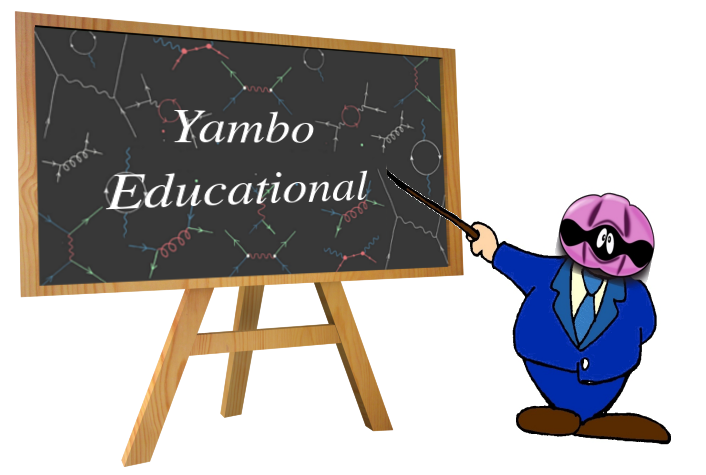Main Page: Difference between revisions
No edit summary |
m (→Cite us) |
||
| (31 intermediate revisions by 7 users not shown) | |||
| Line 1: | Line 1: | ||
= | [[File:Yambo_teaches.png|thumb|center|upright=2.0|]] | ||
Welcome to the Yambo educational page. In this page you will find several informations about how to run Yambo and, more generally, about the methods implemented in the code. | |||
== Yambo Philosophy == | |||
The Yambo Philosophy is simple: '''read, learn, run, cite us'''! | |||
Yambo is a tool but to use it you must first know as much as possible the theories, approximations and methods that are coded in the tool. | |||
'''Yambo should never be used without a clear understanding of the theory laying behind the code'''. | |||
This is exactly the aim of this wiki page. To guide the general Yambo user, advanced or not, in a detailed tour of the Yambo features. | |||
==== | == Read == | ||
* [[ | Reading is the basic ingredient. Here we provide some elemental references of the theories/methods used in Yambo: | ||
* [[ | * [[Theory|Background theory]] | ||
* [[Lectures|Lectures on various topics by the Yambo team]] | |||
* [[Tutorials| Tutorials]] | |||
* [[Selected Readings|Other reading material]] | |||
* [[Cheatsheets|Cheatsheets: Relating theory and code variables]] | |||
* [[Thesis]] | |||
== | == Learn == | ||
The second step in the philosophy are the tutorials. These can be run standalone or via a Yambo-specific Virtual Machine | |||
* [[Tutorials]] | |||
* [[Yambo_Virtual_Machine|A Yambo-based Virtual Machine]] | |||
* [[ | |||
* [[ | |||
== | == Run == | ||
* [[ | * [[Download]] | ||
* [[ | * [[Installation]] | ||
* If you find a '''bug''' or a '''weird behaviour''' in Yambo please report it in the [http://www.yambo-code.eu/forum/ Forum] | |||
* If you get a '''segmentation fault''' please read this page: [[Identify what's causing segmentation fault in Yambo]] | |||
* [ | |||
* [[ | |||
== Cite us == | |||
It is scientifically fair to ''cite the two following articles in any publication based on results obtained with Yambo'' | |||
* {{article | |||
* | |title= Many-body perturbation theory calculations using the yambo code | ||
|authors=Davide Sangalli, Andrea Ferretti, Henrique Miranda, Claudio Attaccalite, Ivan Marri, Elena Cannuccia, Pedro Miguel Melo, Margherita Marsili, Fulvio Paleari, Antimo Marrazzo, Gianluca Prandini, Pietro Bonfà, Michael O Atambo, Fabio Affinito, Maurizia Palummo, Alejandro Molina-Sanchez, Conor Hogan, Myrta Grüning, Daniele Varsano, Andrea Marini | |||
==== | |journal= Journal of Physics: Condensed Matter | ||
|volume= 31 | |||
|pages= 325902 | |||
|year= 2019 | |||
= | |doi=10.1088/1361-648x/ab15d0 | ||
}} | |||
* {{article | |||
|title= Yambo: an ab initio tool for excited state calculations | |||
|authors=Andrea Marini, Conor Hogan, Myrta Grüning, Daniele Varsano | |||
|journal= Comp. Phys. Comm. | |||
|volume= 144 | |||
|pages= 180 | |||
|year= 2009 | |||
|doi=10.1016/j.cpc.2009.02.003 | |||
}} | |||
Check the [http://www.researcherid.com/rid/O-4564-2015 Yambo researcher ID page] for citation information. | |||
Latest revision as of 12:10, 14 September 2023
Welcome to the Yambo educational page. In this page you will find several informations about how to run Yambo and, more generally, about the methods implemented in the code.
Yambo Philosophy
The Yambo Philosophy is simple: read, learn, run, cite us!
Yambo is a tool but to use it you must first know as much as possible the theories, approximations and methods that are coded in the tool.
Yambo should never be used without a clear understanding of the theory laying behind the code.
This is exactly the aim of this wiki page. To guide the general Yambo user, advanced or not, in a detailed tour of the Yambo features.
Read
Reading is the basic ingredient. Here we provide some elemental references of the theories/methods used in Yambo:
- Background theory
- Lectures on various topics by the Yambo team
- Tutorials
- Other reading material
- Cheatsheets: Relating theory and code variables
- Thesis
Learn
The second step in the philosophy are the tutorials. These can be run standalone or via a Yambo-specific Virtual Machine
Run
- Download
- Installation
- If you find a bug or a weird behaviour in Yambo please report it in the Forum
- If you get a segmentation fault please read this page: Identify what's causing segmentation fault in Yambo
Cite us
It is scientifically fair to cite the two following articles in any publication based on results obtained with Yambo
- Many-body perturbation theory calculations using the yambo code, Davide Sangalli, Andrea Ferretti, Henrique Miranda, Claudio Attaccalite, Ivan Marri, Elena Cannuccia, Pedro Miguel Melo, Margherita Marsili, Fulvio Paleari, Antimo Marrazzo, Gianluca Prandini, Pietro Bonfà, Michael O Atambo, Fabio Affinito, Maurizia Palummo, Alejandro Molina-Sanchez, Conor Hogan, Myrta Grüning, Daniele Varsano, Andrea Marini, Journal of Physics: Condensed Matter 31, 325902 (2019).
- Yambo: an ab initio tool for excited state calculations, Andrea Marini, Conor Hogan, Myrta Grüning, Daniele Varsano, Comp. Phys. Comm. 144, 180 (2009).
Check the Yambo researcher ID page for citation information.
